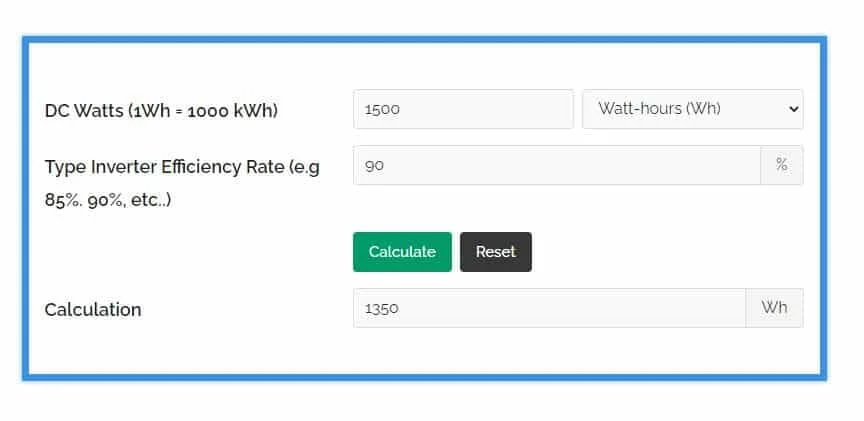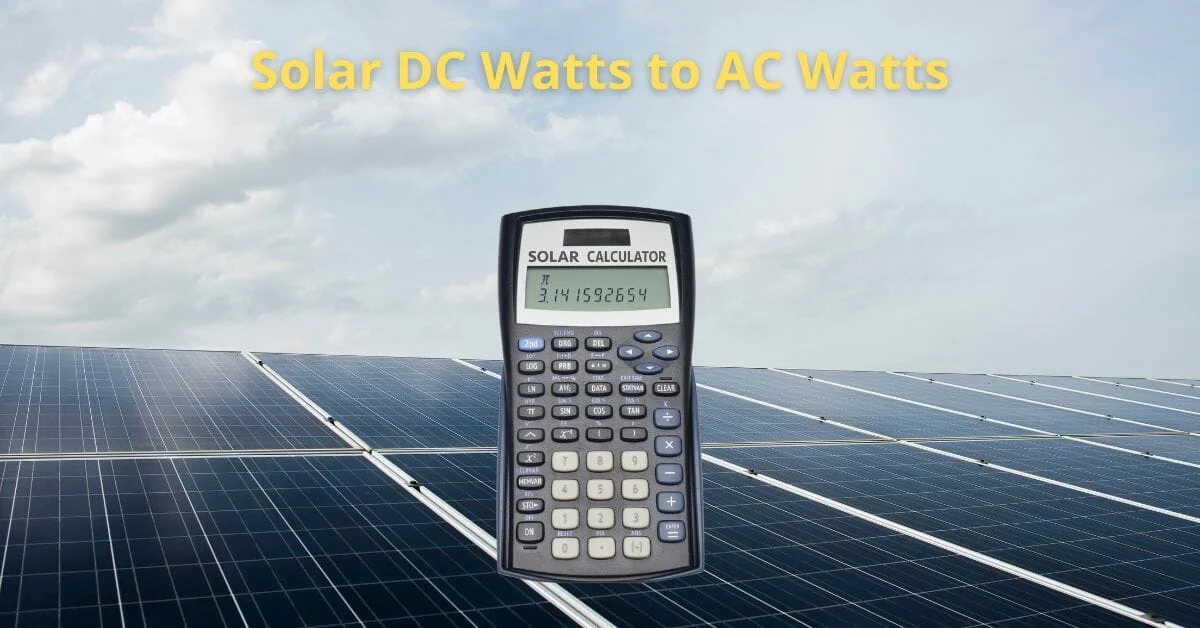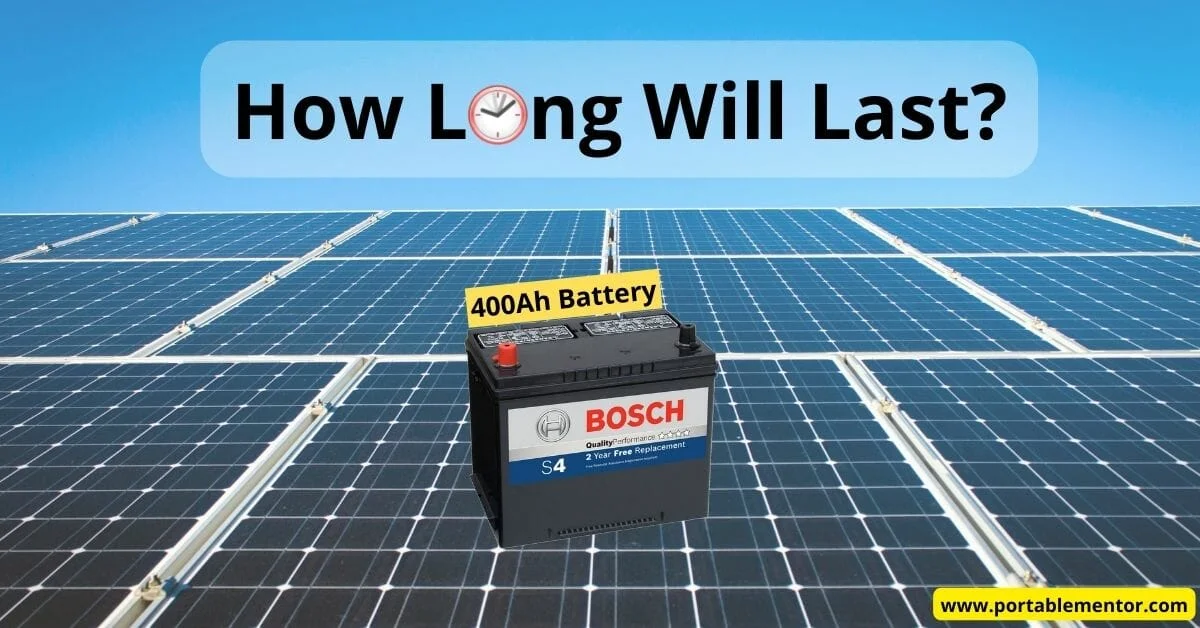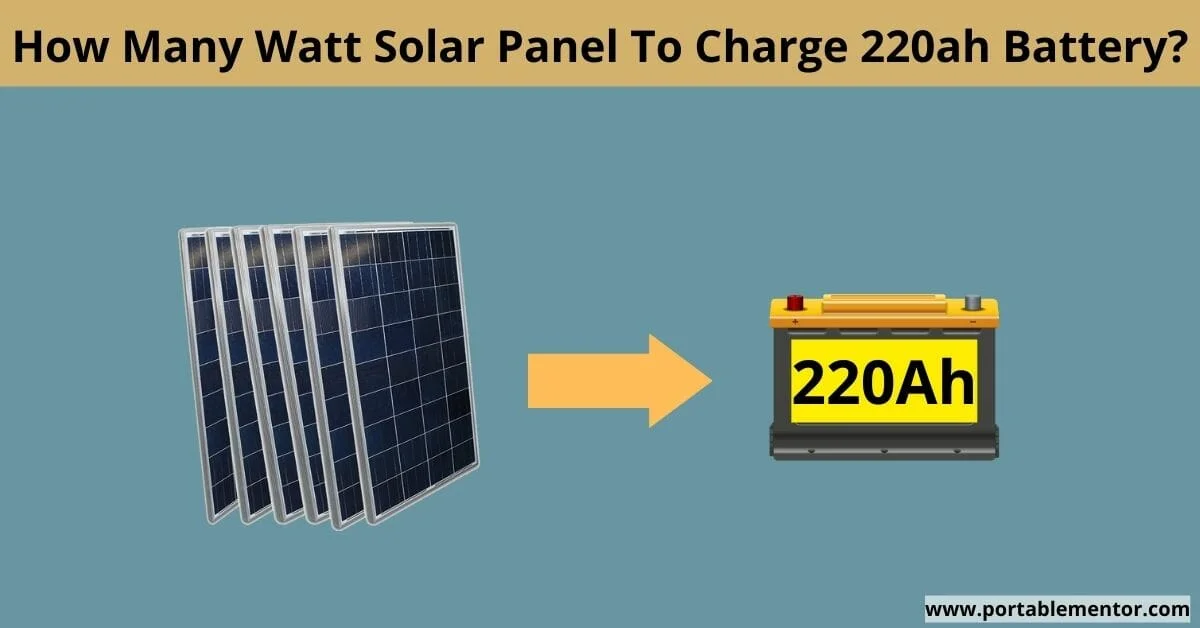Use our solar DC to AC conversion calculator to convert the DC (direct current) power into usable AC (alternating current) power.
DC To AC Conversion Calculator
Note: 1000Wh = 1kWh and most inverters are about 90% efficient. But to check the exact value, have a look at the specs of your inverter.
Assumption
- There’ll be no power loss in AC wiring (use the chart below to figure out the right size wiring for your inverter).
How To Use This Calculator?
DC watts: These can be the watts produced by your solar panels or the total capacity of your battery in Watt-hours to figure out how much actual power you have stored to run your household appliances.
Inverter Efficiency: Read the product description or specs sheet on your inverter (usually located at the bottom side). it’ll be mentioned as inverter efficiency rate (e.g 90%). Then enter 90 in the calculator.
Example
like I have two 200W portable solar panels which produce about 1500 watts of total power in a day (1500Wh) and I have a 1000 watt pure sine wave inverter (with 90% efficiency rate) to run my AC appliances.

1500 DC watts will be equal to 1350 AC watts when using a pure sine wave inverter (90% efficient).
dC to aC conversion formula
Direct current (DC) is the form of power produced by the solar panels and also batteries are designed to store DC current (12v, 24v, 48v).
But most of our household appliances are designed to be run on Alternating current – AC (120-240V). So there will be a power loss when converting DC into AC with the help of an inverter.
To calculate the DC watts into AC watts use this formula:
Formula: Solar AC Watts = (DC watts × Inverter inverter efficiency rate) ÷ 100
Calculate DC amps into AC amps using this formula:
Formula: Solar AC amps = (DC amps × Inverter inverter efficiency rate) ÷ 100
![]() Video – Inverter Efficiency Explained
Video – Inverter Efficiency Explained
DC To AC Conversion Loss
When converting DC watts into AC watts there will be a conversion loss of 5-15% because of the inverter efficiency rate.
Internal temperature and standby power consumption of an inverter is the reason for their less efficient rate.
And also using the wrong size wire will cause some power loss because every size wire is designed to handle a limited amount of current.
So make sure to use the correct size wiring between the battery bank to the inverter.

Use this chart to select the right size wire from the battery bank for your inverter.
DC To AC conversion - chart
Here’s a chart of DC watts into AC watts conversion with a pure sine wave inverter and modified sine wave inverter.
| DC watts | How many AC watts? |
|---|---|
| 100 watts | 90 watts |
| 200 watts | 180 watts |
| 300 watts | 270 watts |
| 400 watts | 360 watts |
| 500 watts | 450 watts |
| 600 watts | 540 watts |
| 700 watts | 630 watts |
| 800 watts | 720 watts |
| 900 watts | 810 watts |
| 1000 watts | 900 watts |
| 1500 watts | 1350 watts |
| 2000 watts | 1800 watts |
| 2500 watts | 2250 watts |
| 3000 watts | 2700 watts |
| 3500 watts | 3150 watts |
| 4000 watts | 3600 watts |
| 4500 watts | 4050 watts |
| 5000 watts | 4500 watts |
| 5500 watts | 4950 watts |
| 6000 watts | 5400 watts |
Note: the above table is based on a 90% efficient inverter.
Related Post: How Long To Charge 12v Battery With Solar panel?
How Do I Convert DC Watts To AC Watts?
To calculate DC watts into AC watts multiply the DC watts by the inverter efficiency rate and divide the result by 100. For example, most inverters are 90% efficient. So, (100 DC watts × 90) ÷ 100 = 90 AC watts.
With the help of this simple calculation formula, you can easily calculate the DC watts of your battery bank or solar panels into AC watts.
Related Posts
- What Will An Inverter Run & For How Long?
- How Many Watts Can A Charge Controller Handle?
- Amps To Watts Calculator
- Solar Panel Amps Calculator (Watts to Amps)
- Solar Panel Calculator For Battery
I hope this short guide was helpful to you. still, have any confusion? LEAVE A COMMENT or contact us. Thank You!



